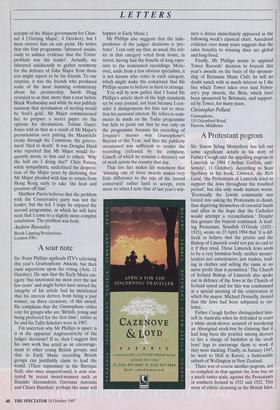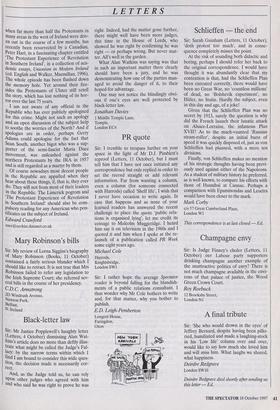A Protestant pogrom
Sir: Simon Sebag Montefiore has left out some significant details in his story of Father Creagh and the appalling pogrom in Limerick in 1904 (`Arthur Griffith, anti- Semite', 11 October). According to Sean Spellisey in his book, Limerick, the Rich Land, 'the Protestants of Limerick tried to support the Jews throughout the troubled period', but this only made matters worse. 'Eventually the Jewish community was forced into asking the Protestants to desist, thus depriving themselves of essential funds and allies in the hope that the Catholics would attempt a reconciliation.' Despite this gesture the boycott continued. A lead- ing Protestant, Standish O'Grady (1832- 1915), wrote on 23 April 1904 that 'it is dif- ficult to believe that the priests and the Bishop of Limerick could not put an end to it if they tried. These Limerick Jews seem to be a very harmless body, neither money- lenders nor extortioners; just traders, trad- ing in clothes and selling the same at no more profit than is permitted,' The Church of Ireland Bishop of Limerick also spoke out in defence of the Jews at the Church of Ireland synod and for this was condemned at a special meeting of the corporation in which the mayor, Michael Donnelly, denied that the Jews had been subjected to vio- lence.
Father Creagh further distinguished him- self in Australia when he defended in court a white stock-drover accused of murdering an Aboriginal stock-boy by claiming that it had long been the practice among drovers to fire a charge of buckshot at the stock boys' legs to encourage them to work if they were slacking. Finally, in January 1947, he went to Hell in Karon, a fashionable suburb of Wellington in New Zealand, There was of course another pogrom, not so complete as that against the Jews but on a much vaster scale, against the Protestants in southern Ireland in 1921 and 1922. This story of ethnic cleansing in the British Isles,
LETTERS
When far more than half the Protestants in many areas in the west of Ireland were driv- en out in the course of a few months, has recently been resurrected by a Canadian, Peter Hart, in a fascinating chapter entitled • 'The Protestant Experience of Revolution in Southern Ireland', in a collection of aca- demic essays, Unionism in Modem Ireland (ed. English and Walker, Macmillan, 1996). The whole episode has been flushed down the memory hole. Yet around their fire- sides the Protestants of Ulster still retell the story, which has lost nothing of its hor- ror over the last 75 years. I am not aware of any official in the Republic who has ever publicly apologised for this crime. Might not such an apology and an open discussion of the subject help to soothe the worries of the North? And if apologies are in order, perhaps Gerry Adams could apologise for the fact that Sean South, another bigot who was a sup- porter of the semi-fascist Maria Duce movement, was unleashed against the northern Protestants by the IRA in 1957 and is still regarded as a martyr by them. Of course nowadays most decent people in the Republic are appalled when they hear about these things, if, that is, they ever (.10. They will not from most of their leaders in the Republic. The Limerick pogrom and The Protestant Experience of Revolution in Southern Ireland' should also be com- pulsory reading for any American who pon- tificates on the subject of Ireland.
Edward Crawford user@revhist.datanet.co.uk



























































































 Previous page
Previous page